
Shu Qingchun, known by his pen name Lao She, was a Chinese novelist and dramatist. He was one of the most significant figures of 20th-century Chinese literature, and is best known for his novel Rickshaw Boy and the play Teahouse (茶馆). He was of Manchu ethnicity, and his works are known especially for their vivid use of the Beijing dialect.

Peng Dehuai was a prominent Chinese military leader who served as China's Defense Minister from 1954 to 1959. Peng was born into a poor peasant family, and received several years of primary education before his family's poverty forced him to suspend his education at the age of ten, and to work for several years as a manual laborer. When he was sixteen, Peng became a professional soldier. Over the next ten years Peng served in the armies of several Hunan-based warlord armies, raising himself from the rank of private second class to major. In 1926, Peng's forces joined the Kuomintang, and Peng was first introduced to communism. Peng participated in the Northern Expedition, and supported Wang Jingwei's attempt to form a left-leaning Kuomintang government based in Wuhan. After Wang was defeated, Peng briefly rejoined Chiang Kai-shek's forces before joining the Chinese Communist Party, allying himself with Mao Zedong and Zhu De.
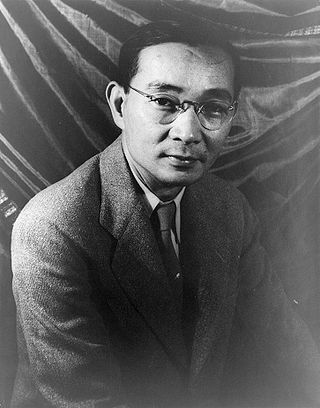
Lin Yutang was a Chinese inventor, linguist, novelist, philosopher, and translator. His informal but polished style in both Chinese and English made him one of the most influential writers of his generation, and his compilations and translations of classic Chinese texts into English were bestsellers in the West.

The Battle of Pingxingguan, commonly called the Great Victory of Pingxingguan in Mainland China, was an engagement fought on 25 September 1937, at the beginning of the Second Sino-Japanese War, between the Eighth Route Army of the Chinese Communist Party and the Imperial Japanese Army.
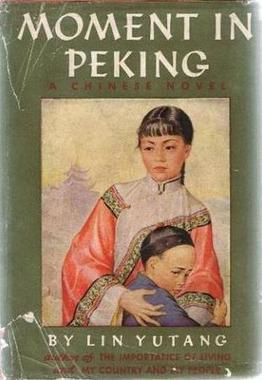
Moment in Peking is a novel originally written in English by Chinese author Lin Yutang. The novel, Lin's first, covers the turbulent events in China from 1900 to 1938, including the Boxer Uprising, the Republican Revolution of 1911, the Warlord Era, the rise of nationalism and communism, and the start of the Sino-Japanese War of 1937-1945.

Su Yu, Courtesy name Yu (裕) was a Chinese military commander, a general of the People's Liberation Army. He was considered by Mao Zedong to be among the best commanders of the PLA, only next to Peng Dehuai, Lin Biao and Liu Bocheng. Su Yu fought in the Second Sino-Japanese War and in the Chinese Civil War. He commanded the East China Field Army during the Chinese Civil War. One of his most notable accomplishments was the capture of Shanghai.
David Hawkes was a British sinologist and translator. After being introduced to Japanese through codebreaking during the Second World War, Hawkes studied Chinese and Japanese at Oxford University between 1945 and 1947 before studying at Peking University from 1948 to 1951. He then returned to Oxford, where he completed his D.Phil. and later became Shaw Professor of Chinese. In 1971, Hawkes resigned his position to focus entirely on his translation of the famous Chinese novel The Story of the Stone, which was published in three volumes between 1973 and 1980. He retired in 1984 to rural Wales before returning to Oxford in his final years.

Storm over Laos, a contemporary history was written in 1961 by Prince Sisouk na Champassak. It is written in English. It is a book on Laos from 1945 to 1961. It goes into much detail about the Secret War in Laos. It also talks about the rise of the Pathet Lao, from its beginnings as a dusty guerrilla unit.

The December 9th Movement was a mass protest led by students in Beiping on December 9, 1935, to demand that the Chinese government actively resist Japanese aggression.

China Sky is a novel by Pearl S. Buck published in 1941. The story centers on love, honor, and wartime treachery in an American-run hospital in the fictional town of Chen-li, China, during the Japanese invasion. The book was the basis of a 1945 film of the same name starring Randolph Scott, Ruth Warrick, Ellen Drew, and Anthony Quinn.

The Malayan Peoples' Anti-Japanese Army (MPAJA) was a communist guerrilla army that resisted the Japanese occupation of Malaya from 1941 to 1945. Composed mainly of ethnic Chinese guerrilla fighters, the MPAJA was the largest anti-Japanese resistance group in Malaya. Founded during the Japanese invasion of Malaya, the MPAJA was conceived as a part of a combined effort by the Malayan Communist Party (MCP) and the British colonial government, alongside various smaller groups to resist the Japanese occupation. Although the MPAJA and the MCP were officially different organisations, many saw the MPAJA as a de facto armed wing of the MCP due to its leadership being staffed by mostly ethnic Chinese communists. Many of the ex-guerrillas of the MPAJA would later form the Malayan National Liberation Army (MNLA) and resist a return to pre-war the normality of British rule of Malaya during the Malayan Emergency (1948–1960).

Feng Depei or Te-Pei Feng was a Chinese neuroscientist and physiologist. He is considered one of founders of modern Chinese neuroscience and physiology.
Adet Lin was a Chinese-American novelist and translator. She also published under the name Tan Yun. She was also known as Lin Rusi.
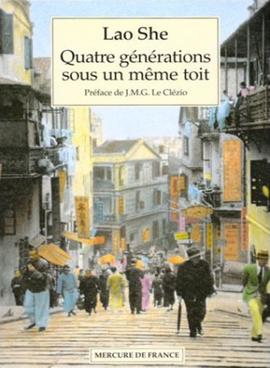
Four Generations Under One Roof is a 1944 novel by Lao She describing the life of the Chinese people during the Japanese Occupation. The novel is divided into three parts:Part 1 - Bewilderment (惶惑) .Part 2 - Ignominy (偷生).Part 3 - Famine (饥荒)
The National Resistance Association of Literary and Art Workers was an organization founded on 27 March 1938 to unite cultural workers in China against the Japanese invaders during the Second Sino-Japanese War. It was led by the politically neutral writer Lao She and membership ranged from 100 to 400 writers during the years of the organization's existence. Notable members included Mao Dun, Ding Ling, Ba Jin, Lin Yutang, Shi Zhecun, and many others.
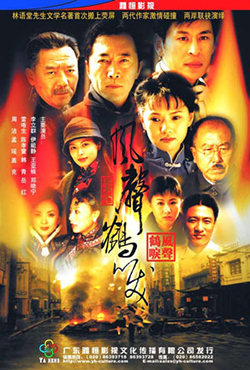
A Leaf in the Storm is a 2003 Chinese television drama series based on Lin Yutang's 1941 novel of the same name, which was first published in English in the United States. The TV series was first shown on CCTV-8 on 12 August 2003. In Taiwan, the series was first shown on Public Television Service on 20 July 2005.
He Luli was a Chinese politician and paediatrician. She entered politics after practicing medicine for 27 years, serving as Vice-Mayor of Beijing, Chairwoman of the Revolutionary Committee of the Chinese Kuomintang, Vice Chairperson of the Chinese People's Political Consultative Conference, and Vice Chairperson of the Standing Committee of the National People's Congress.
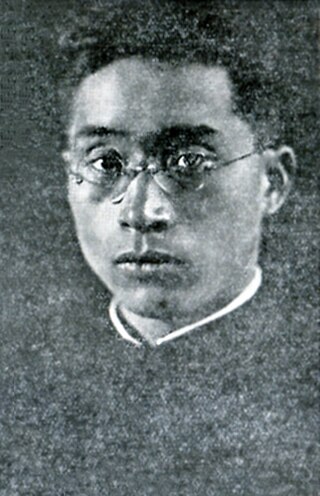
He Siyuan, also spelled Ho Shih-yuan, was a Chinese educator, politician and guerrilla leader. Educated in China, the United States, and France, he was an economics professor at Sun Yat-sen University and education minister of Shandong Province. When Japan invaded China in 1937, he organized a guerrilla force to fight the resistance war in Shandong, and Chiang Kai-shek appointed him the wartime governor of the province.
Xu Xu, aka Hsu Yu (徐訏), was the pen name of Xu Boxu, an important figure in modern Chinese literature. Born in Cixi in the coastal province of Zhejiang, Xu Xu attended Peking University between 1927 and 1932 where he studied philosophy and psychology. In 1932, he moved to Shanghai where he became an associate of Lin Yutang, a liberal and polyglot intellectual who ran a number of successful literary journals. In 1950, Xu Xu left the newly founded People's Republic of China for Hong Kong where he stayed for the rest of his life. Best known as the author of the modern gothic tale Ghost Love or his wartime spy-epic The Rustling Wind, Xu Xu was also a prolific poet, playwright, essayist, literary critic, journal editor, and professor of literature. Many of his popular novels were turned into movies or TV series in post-war Hong Kong and Taiwan. As a writer, editor, and educator, Xu Xu has had a formative impact on a younger generation of post-war writers emerging in Hong Kong and Taiwan. In much of his fiction, and especially in his later works from Hong Kong, Xu Xu explored reality-defying experiences and displayed neo-romantic tendencies, such as aesthetic escapism and mysticism, which place him in the proximity of other modern artists associated with the global revival of romanticism in the 20th-century.
Song of Youth is a novel created by Chinese contemporary writer Yang Mo, published in 1958.














